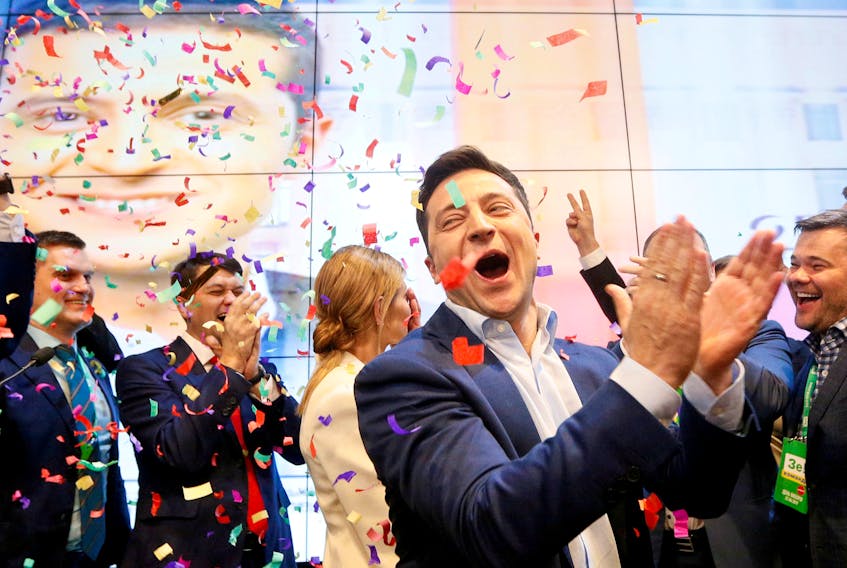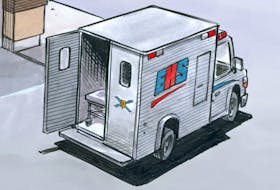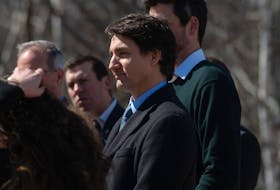“No promises, so no disappointments,” said Ukraine’s Volodymyr Zelenskiy during the election campaign that made him the president last May. It was a daring, even cynical thing for a politician to say, but then he’s not a politician.
Zelenskiy is a television comedian who really doesn’t have much in the way of policies yet — but he does represent a fresh start for Ukraine, and that’s what voters wanted. After two non-violent popular revolutions in 2004 and 2014 that promised change, twice the country ended up back in the hands of the same old corrupt post-Soviet oligarchs. Zelenskiy didn’t need to make promises. He just needed to be different.
He hasn’t actually done much since he got elected, but that’s because he doesn’t have a majority in the Rada (parliament). In fact, he doesn’t have anybody in the Rada, because his party, Servant of the People, was only formed last year. So his first priority had to be a fresh election for a new parliament. It’s happening next Sunday.

Nobody expects Zelenskiy to get the astounding 73 per cent victory that he got in the presidential election, but the public has become a good deal more positive about the future since his election. An opinion poll last week showed that optimism was up from 39 per cent late last year to 71 per cent now.
If Zelenskiy’s party doesn’t win an absolute majority in the Rada, it will at least get 45-48 per cent of the vote. Then he just has to pick a coalition partner from among four smaller parties that will get 10 per cent or less. The likeliest would be Holos, the new party founded by rock-star Svyatoslav Vakarchuk.
Yes, I know. Two showbiz figures, complete novices in politics, trying to run a country of 44 million people (which, by the way, is in a proxy war with Russia). What could possibly go wrong?
But if you are ready for generational turn-over, as Ukrainian voters obviously are, then by definition the politicians you back will be younger people — Zelenskiy is 41, and Vakarchuk is 44 — with little experience in politics.
They do have experience in other walks of life, though. Zelenskiy grew up in the mostly Russian-speaking steeltown of Krivoi Rog in the Ukrainian rustbelt, and managed to get a law degree before becoming a comedian and then building a successful TV production company.
Vakarchuk is not just a singer. He also has a doctorate in theoretical physics — and after the Orange Revolution of 2004-05 he actually sat as a deputy in the Rada for a short time before quitting in disgust at the corruption and infighting.
Most of the members of the new Rada will also be tyros. Vakarchuk’s party is so dedicated to changing the way things are done that it is not letting any member of the current parliament run on its list. Zelenskiy’s parliamentary list is more varied: about a one-third reformers, one-third people with personal or business ties to Zelenskiy — and one-third people with ties to Ihor Kolomoisky.
This is when the red lights start flashing, because Kolomoisky is a major oligarch who owns the TV channel that has been broadcasting Zelenskiy’s show, “Servant of the People,” for the past three years.
“Servant of the People” has a heart-warming plot in which Zelenskiy plays a high school teacher who is suddenly elevated to the presidency by the voters after his rant about the appalling state of Ukrainian politics, secretly taped by a student, goes viral.
Now Zelenskiy leads a real political party with that name, and he is living out the same miracle. Or is he just following a cunning strategy that he and Kolomoisky settled on around four years ago?
What did Kolomoisky stand to get out of it? Well, he was self-exiled in Israel because
of a huge business and legal dispute with Petro Poroshenko, another oligarch who was president at the time and might send him to jail. Kolomoisky could only go home if Poroshenko lost the next election.
But why would Zelenskiy play along with that? He was already very successful, and he could probably have sold that TV series to some other outlet. Did he just want to be president? And if so, did he really plan to do Kolomoisky’s bidding once he got the job?
Thinking too hard about this can drive you crazy. For example, Zelenskiy has just appointed Andriy Bohdan, once Kolomoisky’s lawyer, to the key job of head of administration in the president’s office. That’s pretty suspicious.
However, Bohdan has also served as lawyer to almost every other oligarch in the country, and he probably knows where all the bodies are buried. That would be very useful if Zelenskiy really plans to go after them all, which he must do if he intends to change the way the country is run. You can argue it both ways with equal plausibility.
Right or wrong, however, most Ukrainians currently believe that Zelenskiy is the real thing – and actually, so do I.
Of course, I have been wrong a couple of times in the past.
Gwynne Dyer’s new book is “Growing Pains: The Future of Democracy (and Work).”
RELATED:









